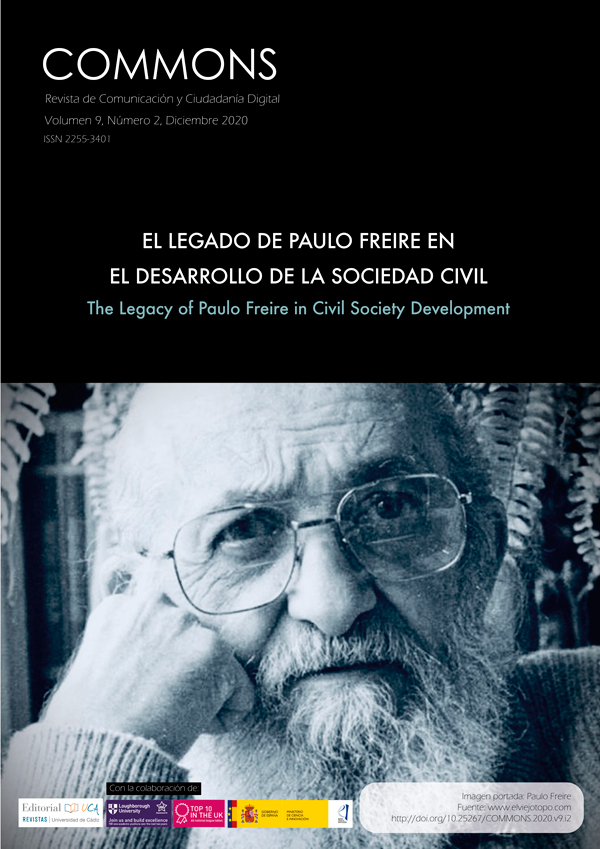Conocer es actuar. Entre la epistemología genética y el legado de Paulo Freire / Knowing is acting. Between genetic epistemology and Paulo Freire's legacy

DOI
https://doi.org/10.25267/COMMONS.2020.v9.i2.02Info
Abstract
The key of knowledge construction has to do with empowering people. Especially those who have been “designed” and treated as merely objects of study and not as active subjects of knowledge. That is one of the most important outcomes of Paulo Freire’s legacy, not only in Brazil, but in the world. But, what does it mean to become “subjects of knowledge”? The social actors who can confront their problems by mean of the construction of their own knowledge, do they really become empowered? The theory and findings granted from Genetic Epistemology, gives us a powerful theoretical and methodological tool for understanding the experiences of “conscientization” as processes of empowering. Freirean method for literacy can be fruitfully interpreted under the light of a scientific theory of the processes of knowledge construction. In studying and practicing Communication for Development, I claim that Information, Communication and Knowledge must be taken as a crucial threefold, non-separable process that includes simultaneously biological, behavioural and social transformations, especially those that have been collectively created. These transformations improve both, individual and group capacity to differentiate and integrate (that means, “knowing”) their experiences of the world, and by doing that, empower their capacity of acting, confronting and overcome their social conditions.
Keywords
Downloads
How to Cite
License
Authors who have published with this journal accept the following terms:
- Authors shall retain their copyright and guarantee the journal the right of first publication of their work, which shall simultaneously be subject to the Creative Commons 3.0 Recognition License, which allows third parties to share the work as long as its author and first publication are indicated in this journal.
- Authors may adopt other non-exclusive licensing agreements for the distribution of the published version of the work (e.g., depositing it in an institutional telematic archive or publishing it in a monographic volume) provided that the initial publication in this journal is indicated.
- Authors are permitted and encouraged to disseminate their work via the Internet (e.g., in institutional telematic archives or on their website) before and during the submission process, which may lead to interesting exchanges and increased citations of the published work. (See The Effect of Open Access).
References
BECKER, F. (2017). Paulo Freire e Jean Piaget: Teoria e prática, en Schème. Revista Eletrônica de Psicologia e Epistemologia Genéticas, 9(Número Especial), 7-47.
BOFF, L. (2014). Saber cuidar. Ética do humano – compaixão pela terra. Petrópolis: Vozes.
BUNGE, M. (1983). La investigación científica. México: Ariel.
CALDART, R. (2004). Pedagogia do Movimento Sem Terra. São Paulo: Expressão Popular.
DALE, J. & HYSLOP-MARGISON, E. (2010). Paulo Freire: Teaching for Freedom and Transformation. The Philosophical Influences on the Work of Paulo Freire, Heidelberg. New York & London: Springer.
DUSSEL, E. (1998). Ética de la liberación en la edad de la globalización y de la exclusión, Madrid: Trotta.
FERREIRO, E. (2007). Alfabetización de niños y adultos. Textos escogidos. México: CREFAL.
FREIRE, P. (1973). La educación como práctica de la libertad. México: Siglo XXI.
FREIRE, P. (1993). Pedagogía de la esperanza. México: Siglo XXI.
FREIRE, P. (2005). Pedagogía del oprimido. México: Siglo XXI. 55ª Edición, Nuevo formato.
FREIRE, P. (2010). Pedagogia da autonomia. Saberes necessários à prática educativa. São Paulo: Paz e Terra.
GARCÍA, R. (2000). El conocimiento en construcción. De las formulaciones de Jean Piaget a la teoría de sistemas complejos. Barcelona: Gedisa.
GARCÍA, R. (2006). Sistemas complejos. Conceptos, método y fundamentación epistemológica de la investigación interdisciplinaria. Barcelona: Gedisa.
GARCÍA, R. (2008). Dialéctica, psicogénesis e historia de las ciencias. En J. PIAGET. Las formas elementales de la dialéctica (201-216). Barcelona: Gedisa.
GONZÁLEZ, J. A. (Ed.) (2018). No está muerto quien pelea. Homenaje a la obra de Rolando García Boutigue. Recuperado de https://cutt.ly/igehsDu
GONZÁLEZ, J. A. (2019). Entre cultura(s) y cibercultur@(s). Incursiones y otros derroteros no lineales, 3ª. Edición. Recuperado de https://cutt.ly/xgehdUh
GONZÁLEZ, J. A. & KROHLING-PERUZZO, C. (Eds.) (2019). Arte y oficio de la investigación científica. Cuestiones epistemológicas y metodológicas. Recuperado de https://cutt.ly/Kgehf2d
KROHLING-PERUZZO, C. & GONZÁLEZ, J. A. (2018). Agroecología y antroponomía en movimientos sociales de Brasil. INTERdisciplina, 6(14), 205- 235. Recuperado de https://cutt.ly/Sgehgbq
OLIVEIRA, P. & DE CARVALHO, P. (2007). A intencionalidade da consciência no processo educativo segundo Paulo Freire. Paidéia, 17(37), 219-230.
PIAGET, J. (1973). La formación del símbolo en el niño. México: Fondo de Cultura Económica.
PIAGET, J. & GARCÍA, R. (1982). Psicogénesis e historia de la ciencia. México: Siglo XXI.
VYGOTSKI, L. & LURIA, A. (2007). El instrumento y el signo en el desarrollo de niño. Madrid: Fundación Infancia y Aprendizaje. Edición a cargo de Pablo del Río y Amelia Álvarez.






